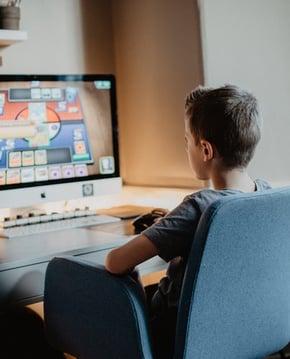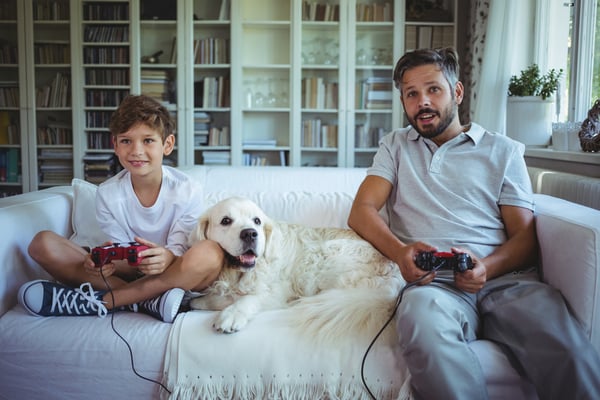Video games and sleep have a tight connection. The two are the means of virtual reality. Both in our sleep and in video games, participate in events that will never happen in real life. However, not only this factor brings these two activities into close relationships. We all are taught to believe that playing video games before bedtime affects sleep but is it really so? Let’s dig into the core of the problem.
Does Good Sleep Matter?
Well. it definitely does. Good sleep and sleep in general play a vital role in maintaining optimal health and well-being. According to the CDC (Centers for Disease Control and Prevention), 1 in 3 adults in the USA don’t get enough sleep. On sleephealth.org, they’ve published some more thought-provoking data stating that in the USA, 70% of adults report that they obtain insufficient sleep at least one night a month, and 11% report insufficient sleep every night. On advisory.com, they present an interesting fact that in 1942, Americans averaged 7.9 hours of sleep each night which is pretty enough to remain in good health. So what are the reasons for such dramatic sleep degradation and what consequences does it bring? Let’s find it out.
According to a Medical News Today article, this gives 9 reasons why good sleep is essential.
- Better productivity and concentration.
- Stronger Immune System
- Lower inflammation
- Preventing depression
- More social and emotional intelligence
- Lower risk of heart disease
- Greater athletic performance
- Better calorie regulation
- Lower weight gain risk
According to everydayhealth.com experts, the major factor behind the steep decline is the availability of technological advances that allow people to work and play 24/7. So are the Video Games to Blame?
Giving the Floor to Science
Do you like to sit for a couple of hours before going to bed with your favorite CSGO bets game or LOL? Then the Australian scientists have bad news for you. Flinders University professors found that video games have a bad effect on sleep.
The experiment, which took place over two days, involved 17 teenagers. Before going to bed, they played violent games for 50 or 150 minutes, after which special devices monitored the participants’ pulse and recorded various parameters of sleep phases. The results were disappointing. Those who played for 150 minutes during bedtime were unable to fall asleep on average for about 39 minutes, and their total sleep time was reduced by about 27 minutes – teens woke up repeatedly at night, although they went to bed at their usual time. But worst of all, the so-called REM sleep phase, during which the brain usually assimilates and processes the information received during the day, was reduced by 12 minutes. This phase is especially important for schoolchildren and students.
A short game, however, does not harm sleep – this is evidenced by the results of a study of those who played for 50 minutes. In addition, scientists have not established the dependence of sleep disturbance on the genre of video games: after spending 2.5 hours at a peaceful city-planning simulator, you will sleep as badly as if you had been playing Postal all this time.

One more study published in the Journal of Clinical Sleep Medicine researched the effects of pre-bedtime video game playing versus DVD program watching. The experiments were on 13-year-old teenage boys. The data confirmed increased time of sleep on-set duration. Moreover, the teenagers reported that sleepiness felt greater after watching a movie than playing a video game. However, the amount of time the teenagers spent in the REM phase did not significantly change under these two conditions. Overall, the study found that playing video games slightly reduced sleep quality.
Video Games Make Us Stay Up Late
One more effect of video gaming on our sleep requires no scientific evidence. Video games tempt us to play more and more rather than go to bed and unwind. Every time you don’t resist the temptation, you drastically reduce your sleep time. This leads to feeling like squash in the morning. The issue of delayed bedtime has never been that relevant.
5 Tips on How to Get More Sleep
Make Your Sleep a Priority
Go to sleep at night and wake up in the morning at the same time. This will help you to set your body’s internal clock and optimize the quality of your sleep. Choose a bad time when you normally feel tired, don’t rush things, and don’t try to force yourself to go to bed at 22.00 just because you want to. Going to bed much earlier will not make you fall asleep faster but instead, make you toss and turn until midnight. One more piece of advice is to avoid naps after 3 p.m, and don’t nap longer than 20 minutes. Stay away from caffeine and late in the evening.
Control Your Exposure to Light
Letting as much natural light to your bedroom as possible will help you wake up in the morning easier. Put as much natural light into your working space. Avoid using gadgets at bedtime (within 1-2 hours). The thing is the screens of your phone, tablets, or laptops, eliminate the blue light that causes a disruptive effect on your sleep.
Pick the Right Time For Exercise
Smart exercising improves your overall health, no need to deny that. People who exercise regularly sleep better at night, if only they choose the right time for exercising. Apart from speeding up metabolism, it also stimulates hormones such as cortisol, the hormone of stress. No problem, actually, if only you do the exercise in the morning or at least no later than 3 hours before sleep.
Mind What You Eat and Drink
Your ration affects how you sleep. Fortunately or not, you can regulate your sleep time by consuming or avoiding certain products. During the daytime, limit caffeine and nicotine consumption, These are powerful stimulants that can disrupt your sleep. Avoid a big meal at night, alcohol, and too much liquid in the evening. If you can’t resist hunger, grab a small portion of whole-grain, low-sugar cereal, banana, milk, or yogurt.
Sleep Environment Matters
A tranquil sleep environment sends a special signal to your brain that it’s time to calm down and take rest after the daytime routine. Sometimes, your sleeping environment instead of encouraging you to sleep disrupts it. The general tip concerning the betterment of the conditions of your sleeping place is to keep it dark, quiet, and cool. However, I would also suggest making sure your bed is comfortable and reserving it for sleep only. By doing so, your brain will learn that it’s high time to sleep every time your head touches the pillow.
Final Thoughts
Sleep is vital in maintaining your body and mind healthy and well-equipped. Sleep plays an essential role in our lives keeping us fit, preventing depression, lowering the risk of heart disease, and etc. With the rapid development of modern technologies, more and more people admit that their relationships with sleep deteriorated. The results of researches conducted by scientists show us contradicting results. Some feel deeply concerned about the reduced duration of the REM phase of sleep while others state that this difference is vague. Anyway, playing video games before sleep does affect sleep. You can get more bedtime if put in some effort and treat this issue more seriously.
Sleep needs to become a priority.
Teens who are able to establish good sleep habits are significantly less likely to suffer from depression or to have suicidal thoughts.
Alaska Sleep Clinic is the leader in Alaska for Pediatric Sleep Studies. We know how important your child is to you and are here to help! Call Alaska Sleep Clinic @ 907-770-9104.












